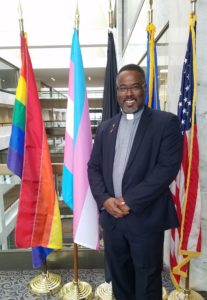CLGS is in its second year of working as a part of a national coalition of equality organizations to educate federal policymakers about the harms caused to LGBTQ people by discrimination and the need for a federal response to anti-LGBTQ discrimination. Equality organizations from North Carolina, Florida, Texas, Ohio, Georgia and Utah are meeting with their members of Congress to share compelling stories from LGBTQ people in their states with the goal of changing hearts and minds. Rev. Dr. Roland Stringfellow, Coordinator of the CLGS African American Roundtable, is representing this work in the State of Michigan on behalf of CLGS.
Recently, Rev. Stringfellow and his coalition partners met in Washington DC for a day of training about the “Fairness Act,” which is the Republican version of the Equality Act. The Equality Act (H.R.5), which passed the US House on 17 May 2019, prohibits discrimination based on sex, sexual orientation, and gender identity in public accommodations and facilities, education, federal funding, employment and housing. The bill prohibits the Religious Freedom Restoration Act of 1993 from providing a claim, defense, or basis for challenging such protections.
In contract, the “Fairness For All” Act, sponsored by Republican Representative Chris Steward of Utah, would also ban discrimination against LGBTQ people in employment, housing, education, and public accommodations — but it carves out broad exemptions for churches and other religious organizations. Discrimination against LGBTQ parents in adoption and foster care services, as well as discrimination about LGBTQ people in educational institutions, would be permitted under this version of the bill.
Rev. Stringfellow and his colleague Rev. Ruth Hawley-Lowry of Zeeland, Michigan, recently met with Michigan lawmakers Senator Gary Peters (D), Rep. Andy Levin (D), Rep. Justin Amash (I), Rep. Bill Huizenga (R), and Rep. Fred Upton (R). Rep. Upton is co-sponsor of the “Fairness Act” and both he and Rep. Amash agreed to meet with LGBTQ people in who live in their districts in 2020 to share personal stories of how non-discrimination legislation would impact their lives. A key phrase that is shared with these lawmakers is that this work is “Pastoral, not Political” since we are not in the business of endorsing any political candidate.
Revs. Stringfellow and Hawley-Lowry are continuing this pastoral work by conducting training sessions for clergy and religious leaders throughout Michigan. Recently, in Holland, Michigan, they conducted a half-day training co-led by staff from the Center for American Progress in Washington DC, using a Toolkit for Faith Leaders on LGBTQ Equality, which provides step-by-step suggestions on how to meet with federal lawmakers and speak with them about supporting non-discrimination legislation at the state and federal levels.
CLGS is proud to continue this important national work in the upcoming year!




